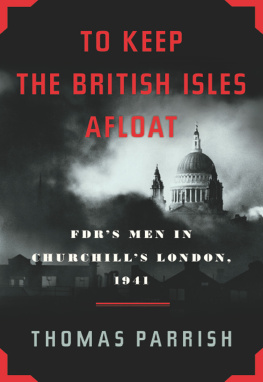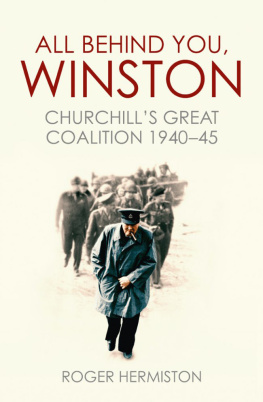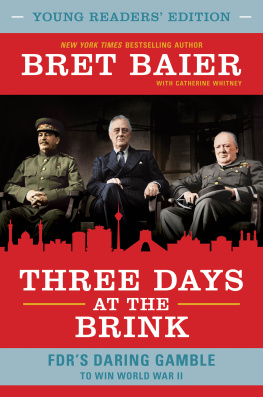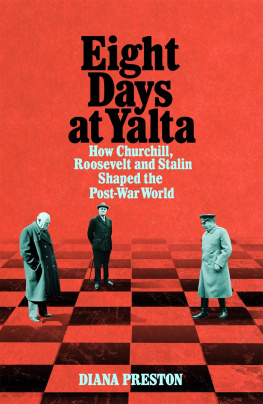To Keep the British Isles Afloat
FDRs Men in Churchills London, 1941
Thomas Parrish

I want you to go over to London and recommend everything we can do, short of war, to keep the British Isles afloat.
President Roosevelt to Averell Harriman
February 18, 1941
T his account seeks to capture times and places that have become strangely distant and in many ways mythical. It tells the story of the troubled gestation and difficult birth of the Anglo-American alliance, which has been a central fact in the world since World War II, and at the same time it tells the story of Harry Hopkins and Averell Harriman, two remarkable men who played vital roles in the development of this unique international partnership in its early, fragile days. Behind these special presidential representatives we see the figure of Franklin D. Roosevelt, the pragmatic designer and director of this unprecedented alliance, as he patiently persevered from small beginnings despite all the traditional (notably including the strong isolationist outlook in the United States) and political obstacles standing in the way.
When urgency came in June 1940 with the dramatic escape of British forces at Dunkirk and the unexpected surrender of France, the president made an unprecedented and pivotal move toward alliancethe destroyers-bases deal, seen here from the inside. For Roosevelt, this decidedly unneutral exchange represented a step not toward war but toward national security by helping to sustain Britain in the fight.
But could, and would, Britain hold out? FDR took an extraordinary direct step to find out by dispatching a personal representative, Harry Hopkins, to see and report. These moves in 1940 and 1941 involved new kinds of thinking, as did lend-lease, the material manifestation of the alliance, which was being debated in Congress while Hopkins made his varied investigations in Britain. His favorable reports on Winston Churchill and British prospects undergirded lend-lease, though controversies and lesser disputes had to be thrashed out. Then, with the passage of lend-lease, came the final complementthe dispatch of Averell Harriman, the second of FDRs special envoys, to England to oversee the relationship at the receiving end and to act as the British terminal of the link between Roosevelt and Churchill, through Hopkins and Harriman. The adventures of Hopkins and Harriman and the many sides of their relationship to the prime minister dramatize the creation of the working alliance. Could the United States keep Britain in the war against Germany? It was their task to provide a positive answer to the question.
The narrative shows how even the presidents closest associates failed to understand his purposesthat when he spoke of all aid short of war he meant exactly that, though most commentators, friendly and otherwise, presumed he was simply dissembling to minimize opposition. The story is told through the eyes of the participants at the time, showing how in their different ways they tried to deal with the issues they faced with the knowledge they had. Here, as I have done previously, I acknowledge Robert K. Massies formulation of three golden principles for narrative: importance, immediacy, and suspense. The importance of the story speaks for itself, I believe, in its own day and still in ours, and immediacy and suspense come when we see and feel what the characters saw and felt at the time of the story, or what others knew and our principals could have known. What is discussed and dramatized in the book is, of course, chosen on the basis of what we know today, or think we know, but that is quite different from interference in the story by forecasting (little did he know), or hindsight, or condescension. Guided by today, we can live in the world of yesterday and perhaps even learn something from it.
T HOMAS P ARRISH
CRISIS, 1940
F or Americans, Europe has become the place where horrible and unaccountable things happen, a refugee Czech journalist wrote in early 1941, looking back across the Atlantic at the continent he had fled. The pleasant dream of a United States of Europe has become a cruel reality. War, terror, slavery, and hunger have fused most of the Old Continent into a unit. Frontiers have been washed away by waves of common suffering. Since the same Gestapo presides over their single, tragic fate, what difference can there be now between Frenchmen, Dutchmen, Czechs, Serbs, or Norwegians? Never before in history have so few brought so much suffering to so many.
The tragedy that befell Europe had struck with quick violence. During the first half-year of the war that began in September 1939, Americans and their leaders had felt little sense of urgency about the outcome, since the British and French were comfortably presumed to be capable of standing off Nazi Germany just as they had, though barely, stood off imperial Germany in the Great War of 191418. Indeed, Life magazine declared, as fighters the French are tops, and these tough poilus were led by the largest and best-trained officer corps in the world. A French journalist noted that half of the people might have confidence in the premier, but four Frenchmen out of four believe in the French Army. But in the early spring of 1940 the poilus and their British allies had yet to engage in much actual fighting with Adolf Hitlers Wehrmacht; seven months earlier, while the Germans were demolishing Poland, the Allies had stood quietly on the border of the Reich, with many of the French troops manning the great frontier defensive cordon, the Maginot Line. So uneventful had been the whole scene, for month after month, that it acquired various derogatory nicknames; the Bore War was one, but the lasting tag came from America: the Phony War.
What did this strange departure from normal wartime protocol really portend? One American, a private citizen, not only asked such questions but possessed the connections that would enable her to turn her curiosity into a quest. In February 1940 Clare Boothe, a playwright and fashion editor, arrived in Europe to make her own assessment of the Phony War. (At the time of her sailing, the current Gallup poll showed that 68 percent of the U.S. public believed the country would stay out of the wara hardly surprising finding, if only because there did not appear to be much war to get into.) Though not a reporter by trade, Boothe came to Europe as an accredited correspondent for Life, a status she had readily acquired as the wife of the magazines publisher, Henry R. Luce. Even if she seemed unlikely in the role of political and military investigator, the elegant and witty Boothe enjoyed certain advantages beyond her connection with Life , in particular a wide acquaintanceship in the social and diplomatic worlds; one way or another, she had access to everybody.
In Paris, among the many and strident clashes of political opinion she encountered, Clare Boothe heard much confidence expressed in the state of French morale and much talk about the idea that once again, as in 1918, the Germans would run out of time: a long war favored the Allies. And this time, said the voices in the salons as social life whirled on, il faut en finir we must finish the job! Another reporter noted the refrain: Were sick of all this blackmail and these crises coming up every six months. The eminent British military critic B. H. Liddell Hart declared in an article widely read in France, Britain, and the United States (and, no doubt, in Germany) that he saw little likelihood of a successful German offensive, because their margin of superiority in numbers is not enough; however, extraordinarily bad generalship on the Allies side could give the enemy at least the chance of success.









